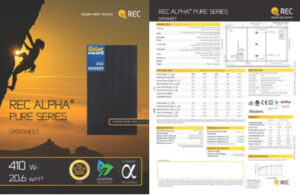Forbes - How Many Solar Panels Do I Need For My Home? A Complete Guide To Help You Decide
Thinking about going solar but unsure how many panels your home requires? This complete guide breaks down all the factors, from your energy consumption to sunlight exposure and panel efficiency. Learn how to calculate the ideal number of solar panels for your home, save on energy bills, and make a smart investment in clean energy.
Forbes - A Complete Guide To Payback Periods For Solar Panels
Switching to solar panels can lead to significant savings on your energy bills, but understanding your payback period – the time it takes to recover your investment – is key. This guide breaks down how to calculate your solar payback period and what factors can impact it, so you can make an informed decision about going solar.
Guide For Homeowners Associations on Solar Installations in Virginia
This guide by the Maryland, DC, and Virginia Solar Energy Industries Association (MDV-SEIA) offers guidance for Virginia HOAs on drafting solar installation guidelines. This resource outlines MDV-SEIA’s stance, ensures compliance with state laws, and provides reasonable restrictions for solar arrays to help homeowners and HOAs navigate solar energy decisions effectively.
FAQs
What is the REC Alpha Pure Black 405W solar panel?
The REC Alpha Pure Black 405-watt monocrystalline solar panel offers outstanding power output and performance. With its all-black design, featuring a black back sheet and a black anodized aluminum frame, it combines exceptional durability with a sleek, attractive appearance. In terms of high operating efficiency, long-term power retention, and elegant black-on-black aesthetics, the REC Alpha Pure 405W is truly one of the best panels you can choose.
Check out the REC Alpha Pure spec sheet:

Please also do your own research on solar panels. Here are two reviews of the REC Alpha Pure:
Are there federal and state solar incentives?
Navigating the world of solar incentives can significantly impact the decision-making process for homeowners considering the switch to renewable energy. At the federal level, the United States offers a Solar Investment Tax Credit (ITC), which allows homeowners to deduct a portion of their solar installation costs from their federal taxes. This substantial incentive reduces the overall cost of going solar, making it an even more attractive investment for those looking to decrease their carbon footprint while saving on energy costs.
In addition to the federal ITC, many states and localities offer their own incentives, which can include rebates, property tax exemptions, and net metering policies that further decrease the cost and increase the return on investment of residential solar systems. These state-specific incentives vary widely, so you should research or consult with a solar professional about what’s available in your area. For instance, in Virginia, where MC3 Solar is based, homeowners may be eligible for additional rebates or programs designed to encourage solar adoption. By leveraging both federal and state incentives, homeowners can maximize their savings and contribute to a more sustainable energy future.
What’s the expected lifespan of a solar panel, and how does it affect energy production over time?
Solar panels are built to last and provide energy for many years. The average lifespan of a solar panel is around 25 to 30 years, though many panels continue to operate efficiently well beyond this timeframe. It’s important to note that while solar panels do degrade over time, leading manufacturers ensure a slow degradation rate, typically around 0.5% to 0.8% per year. This means that after 25 years, high-quality panels like the REC Alpha Pure 405W can still produce around 85% to 90% of their original power output. This gradual decrease in efficiency is factored into the design and financial calculations of solar power systems to ensure they remain a viable and cost-effective energy solution for decades.
Can solar panels work in less sunny climates, and how does weather affect solar energy production?
Solar panels can indeed generate electricity in less sunny climates and on cloudy days, albeit at reduced efficiency compared to direct sunlight conditions. Solar technology has advanced to the point where panels can capture indirect sunlight and even produce power during overcast weather, although the energy output will be lower than on clear, sunny days. Additionally, solar panels are generally more efficient in cooler temperatures, so a bright, cold day can still be very productive for solar energy generation. Geographic location impacts the overall amount of energy your system can produce annually, but innovations in panel technology and system design allow for effective energy production in a wide range of climates and conditions.
What maintenance is required for a residential solar panel system?
Solar panel systems are designed to be low maintenance, thanks to their durable construction and lack of moving parts. The most common maintenance task is cleaning the panels to remove dust, dirt, leaves, or snow that might accumulate and block sunlight. In many regions, rainfall is sufficient to naturally clean the panels. However, if you live in an area with high dust levels or minimal rainfall, occasional cleaning may be necessary to maintain optimal performance.
Beyond cleaning, it’s a good idea to have your system inspected periodically by a professional to ensure all components are functioning correctly. These inspections can help catch and rectify any potential issues early, ensuring your system continues to operate efficiently over its lifespan.
